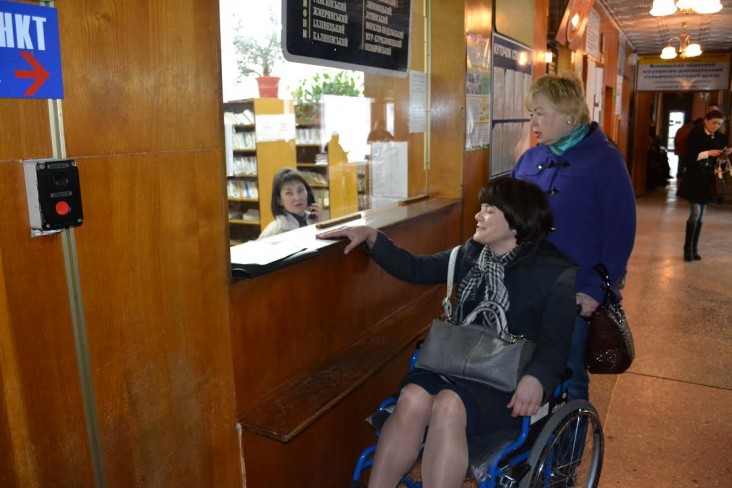Speeches Shim

February 2016—Women with disabilities in Ukraine are receiving better access to health care now that medical professionals understand what it’s like to lack mobility.
In 2014, USAID’s Healthy Women in Ukraine Program conducted an evaluation on wheelchair-bound women’s access to health care facilities and uncovered several physical and mental barriers. The findings prompted a quick and effective awareness-raising campaign directed at medical professionals.
The study found that most facilities lack adequate access for people with disabilities. Women reported humiliating situations arising from inadequate restrooms and outdated gynecological exam chairs. Ninety-one percent of health providers participating in the evaluation had received no special training on providing services to patients with disabilities.
USAID responded by conducting an initial training in Vinnytsia for 30 health providers and decision-makers from around Ukraine on the unique needs of people with disabilities.
Dr. Olga Krassioukova-Enns, an internationally respected expert on disability issues, designed an exercise that forced participants to step into the shoes of a person who uses a wheelchair. They were asked to use a wheelchair to transport themselves to the Vinnytsia Oblast Hospital without outside help. Most participants arrived at the hospital only to find entry impossible.
The front entrance to the facility was equipped with a wide vehicle barrier that opened only by order of the hospital administration. In effect, the barrier blocked all motor vehicles from entering. Pedestrians could walk around the barrier and through a narrow passageway, but people in wheelchairs did not have that option. They had to enter the sprawling hospital by traveling an additional mile around to the back entrance where access was possible. In addition, the registration window was not accessible to people in wheelchairs.
Dr. Inna Kukuruza, chief OB/GYN of Vinnytsia Oblast Hospital and a training participant, promised to resolve the issues and did so in a single day by removing the vehicle barrier as an impediment.
“We take so many things for granted and do not see that there are people to whom such seemingly simple things can be such big barriers,” said Kukuruza. “Today I could see myself how extremely important it is to put oneself in another person’s shoes, to see the world through his or her eyes and realize what factors, indeed, can ruin a comfortable life.”
“That’s a surprise!” exclaimed Galyna*, a wheelchair-bound individual, upon seeing the barrier removed. “I could not go to the hospital for a long time because it was like an unassailable fortress. My husband encouraged me to visit and now I understand that he meant to visit not only today but from now on!”
Many additional barriers for people with disabilities still need solutions, but some (like the wide vehicle barrier) have relatively simple remedies. Kukuruza demonstrated to her colleagues that overcoming obstacles for people with disabilities is possible. One just needs to see things from the perspective of a disabled person and be willing to make changes to accommodate special needs.
The Healthy Women of Ukraine Program, which runs from October 2011 through September 2016, helps Ukraine to increase effective use of modern contraceptive methods. The project builds the skills of health providers in selected oblasts to provide family planning counseling as well as building the skills of NGO partners in family planning communication and advocacy. It also supports the Ministry of Health in implementing the National Reproductive Health Program.
*Full name not available.
LINKS
Follow @USAIDUkraine, on Facebook

Comment
Make a general inquiry or suggest an improvement.